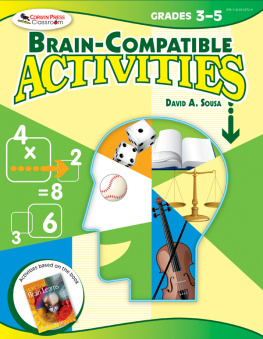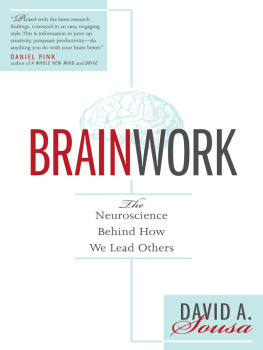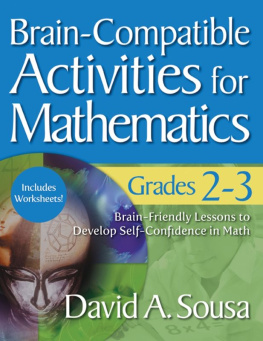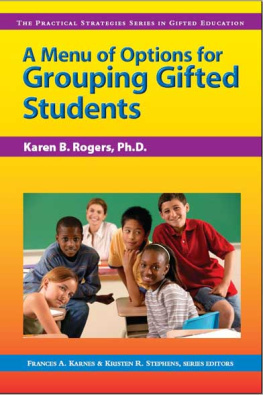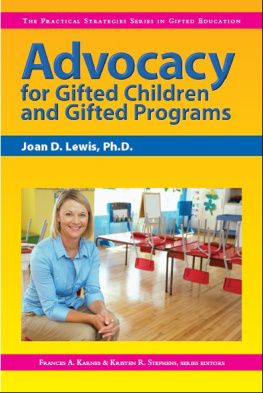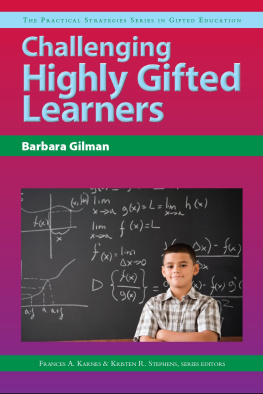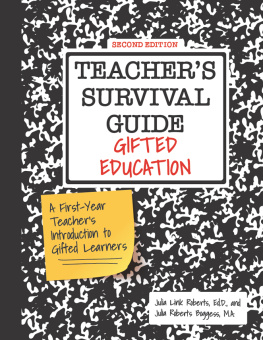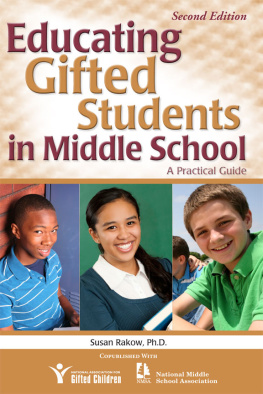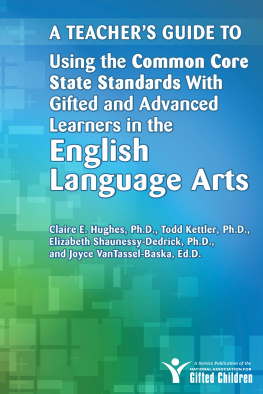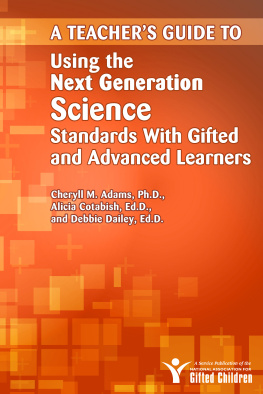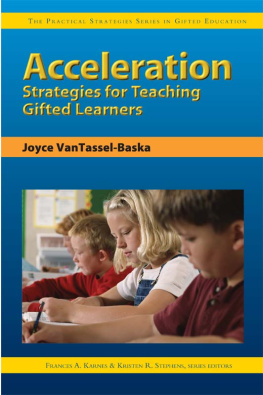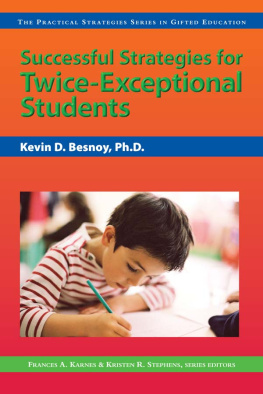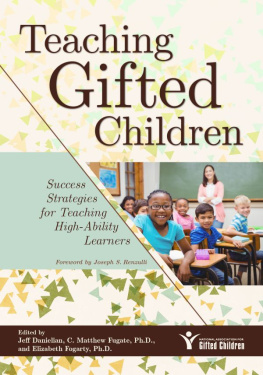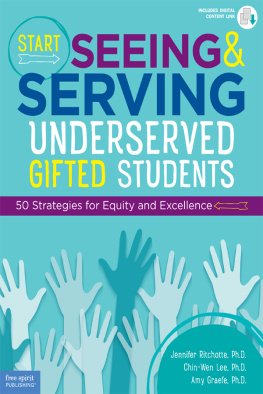HOW THE
Gifted
Brain Learns
SECOND EDITION
Use what talent you possess: the woods would be very silent if no birds sang except those that sang best.
Henry Van Dyke
HOW THE
Gifted
Brain Learns
SECOND EDITION
David A. Sousa

Copyright 2009 by David A. Sousa
All rights reserved. When forms and sample documents are included, their use is authorized only by educators, local school sites, and/or noncommercial or nonprofit entities that have purchased the book. Except for that usage, no part of this book may be reproduced or utilized in any form or by any means, electronic or mechanical, including photocopying, recording, or by any information storage and retrieval system, without permission in writing from the publisher.
For information:
 | Corwin
A SAGE Company
2455 Teller Road
Thousand Oaks, California 91320
(800) 233-9936
Fax: (800) 417-2466
www.corwinpress.com | SAGE India Pvt. Ltd.
B 1/I 1 Mohan Cooperative Industrial Area
Mathura Road, New Delhi 110 044
India |
SAGE Ltd.
1 Olivers Yard
55 City Road
London EC1Y 1SP
United Kingdom | SAGE Asia-Pacific Pte. Ltd.
33 Pekin Street #02-01
Far East Square
Singapore 048763 |
Printed in the United States of America.
Library of Congress Cataloging-in-Publication Data
Sousa, David A.
How the gifted brain learns/David A. Sousa.2nd ed.
p. cm.
Includes bibliographical references and index.
ISBN 978-1-4129-7172-0 (cloth)
ISBN 978-1-4129-7173-7 (pbk.)
1. Gifted childrenEducationUnited States. 2. Gifted childrenUnited StatesIdentification. 3. BrainLocalization of functions. I. Title.
LC3993.9.S68 2009
371.95dc22 2009019964
This book is printed on acid-free paper.
09 10 11 12 13 10 9 8 7 6 5 4 3 2 1
| Acquisitions Editor: | Carol Chambers Collins |
| Editorial Assistant: | Brett Ory |
| Developmental Editors: | Jessica Tyerman and Jennifer Beasley |
| Production Editor: | Cassandra Margaret Seibel |
| Typesetter: | C&M Digitals (P) Ltd. |
| Proofreader: | Theresa Kay |
| Cover Designer: | Tracy Miller |
| Graphic Designer: | Karine Hovsepian |
Contents
About the Author
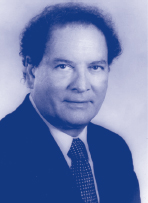
David A. Sousa, Ed.D., is an international consultant in educational neuroscience and author of seven best-selling books on how to translate brain research into educational practice. For more than 20 years he has presented at national conventions of educational organizations and has conducted workshops on brain research and science education in hundreds of school districts and at colleges and universities across the United States, Canada, Europe, Asia, Australia, and New Zealand.
Dr. Sousa has a bachelor of science degree in chemistry from Massachusetts State College at Bridgewater, a master of arts in teaching degree in science from Harvard University, and a doctorate from Rutgers University. He has taught high school science, served as a K12 director of science, and was superintendent of the New Providence, New Jersey, public schools. He has been an adjunct professor of education at Seton Hall University and a visiting lecturer at Rutgers University. He is a past president of the National Staff Development Council.
Dr. Sousa has also edited science books and published articles in leading educational journals. He has received awards from professional associations and school districts for his commitment and contributions to research, staff development, and science education. He is a member of the Cognitive Neuroscience Society, and he has appeared on the NBC Today show and on National Public Radio to discuss his work with schools using brain research.
Acknowledgments
Corwin gratefully acknowledges the contributions of the following reviewers:
Mary Beth Cary, Teacher
Worth County Primary School
Sylvester, GA
Chris Godwin, Executive Director for General and Gifted Curriculum
Johnston County Schools
Smithfield, NC
J. Christine Gould, Ph.D., Associate Professor of Teacher Education
University of WisconsinStevens Point
Steve Hutton, School Improvement Consultant
Villa Hills, KY
Debra K. Las, Science Teacher
Rochester Public Schools
Rochester, MN
Kathy Tritz-Rhodes, Principal
Marcus-Meriden-Cleghorn School
Marcus and Cleghorn, IA
Thea H. Williams-Black, Ph.D., Assistant Professor of Elementary Education
The University of Mississippi
University, MS
Leslie Owen Wilson, Ed.D., Professor of Teacher Education
University of WisconsinStevens Point
Preface to the Second Edition
Welcome to the second edition! Since the publication of the first edition, there have been major developments in our understanding of how the human brain develops and functions. Brain imaging studies around the world number more than 1,500 a year, yielding additional insights into how we learn. Technologies, such as transcranial magnetic stimulation, have emerged to investigate cerebral processing. Meanwhile, researchers in genetics have found new links to the neurological processes involved in thinking. All of the chapters in this second edition have undergone major revision to include these developments and the findings of new studies. In addition, I have
- Combined has been distributed among other chapters to be closer to the text associated with it.
- Expanded and renamed the original chapter on Musical Talent to Artistic Talent so that it now includes music, dance, theater, and visual art.
- Moved the three chapters on specialized talents (language, mathematical, and artistic) so that they follow the chapters discussing broader characteristics of gifted brains.
- Added a new feature in most chapters called From the Desk of a Teacher to present specific examples of elementary and secondary classroom applications.
- Added more than 200 new references, including scientific studies for those who wish to read the original research.
Although the pace of neuroscientific research on the nature of giftedness is not as fast as some would like, it is, nonetheless, making progress in understanding the genetic and environmental triggers that result in extraordinarily high levels of academic achievement and talent. This revision delves into the research areas of greatest promise and highlights ways that the findings from that research can be used to develop instructional strategies that will help all students reach their full potential.
David A. Sousa
Introduction
When the first edition of this book was published several years ago, our understanding of giftedness was largely based on theories and research in behavioral and cognitive psychology. Neuroscientists had barely begun to use their scanning technologies to look inside the working brain of gifted and talented people. But during the first decade of this twenty-first century, the field of neuroscience has just exploded, splintering into new disciplines, such as social cognitive neuroscience and behavioral neuroscience. Of particular interest to educators is the emergence of educational neuroscience, an area that promises to enrich pedagogy with new insights into how we can translate research in the neurosciences into educational practice.
Next page

